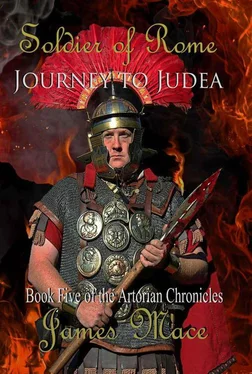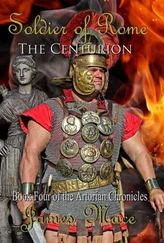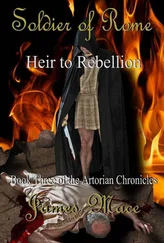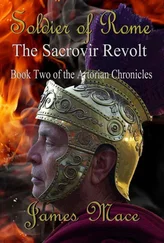James Mace - Soldier of Rome - Journey to Judea
Здесь есть возможность читать онлайн «James Mace - Soldier of Rome - Journey to Judea» весь текст электронной книги совершенно бесплатно (целиком полную версию без сокращений). В некоторых случаях можно слушать аудио, скачать через торрент в формате fb2 и присутствует краткое содержание. Жанр: Исторические приключения, на английском языке. Описание произведения, (предисловие) а так же отзывы посетителей доступны на портале библиотеки ЛибКат.
- Название:Soldier of Rome: Journey to Judea
- Автор:
- Жанр:
- Год:неизвестен
- ISBN:нет данных
- Рейтинг книги:5 / 5. Голосов: 1
-
Избранное:Добавить в избранное
- Отзывы:
-
Ваша оценка:
- 100
- 1
- 2
- 3
- 4
- 5
Soldier of Rome: Journey to Judea: краткое содержание, описание и аннотация
Предлагаем к чтению аннотацию, описание, краткое содержание или предисловие (зависит от того, что написал сам автор книги «Soldier of Rome: Journey to Judea»). Если вы не нашли необходимую информацию о книге — напишите в комментариях, мы постараемся отыскать её.
Soldier of Rome: Journey to Judea — читать онлайн бесплатно полную книгу (весь текст) целиком
Ниже представлен текст книги, разбитый по страницам. Система сохранения места последней прочитанной страницы, позволяет с удобством читать онлайн бесплатно книгу «Soldier of Rome: Journey to Judea», без необходимости каждый раз заново искать на чём Вы остановились. Поставьте закладку, и сможете в любой момент перейти на страницу, на которой закончили чтение.
Интервал:
Закладка:
“This is not my first time checking on the locals,” Justus reassured him with a wink. He then lightly pounded his fist against the side of his cloak, and Artorius could hear the rattling of his gladius scabbard. “Remember, I also speak fluent Aramaic and passable Hebrew. Besides, the more hostile zealot types avoid this Jesus of Nazareth. His talk of peace and reconciliation is not to their liking, and there are a host of other teachers and prophets for them to latch on to.”
Presently they arrived at the barracks. In front of the line of stucco buildings, Valens had formed the century into two columns on either side of the wagon. Artorius’ servant, Nathaniel, sat on the wagon bench, holding the reins. Artorius turned and clasped his friend’s hand.
“Safe travels,” Justus said.
“We should only be gone a week,” Artorius observed. “A day, maybe two by sea to Tripolis, then a couple more by road to Raphaneae. And, as you already know, in my absence you are in command.”
“Of course,” Justus replied. “And I’ve already spoken with Centurion Magnus. Depending on how long it takes me to find this Nazarene, which should not prove difficult, and however long he gives me useful information, I may not get any time as cohort commander.”
Both men chuckled at this observation. Justus then gave a nod before heading towards the stables, where a groomsman was waiting with his horse.
“The century is formed and ready to march, sir,” Valens said with a salute as Artorius walked over to his men.
Artorius returned the salute and took his place next to his signifier at the head of the column. Though both he and Valens were authorized to travel by horseback, they knew that space on the small ship would be cramped between the cargo wagon and eighty legionaries taking up almost all available space on the top deck. He thought back to the last time they had traveled by ship during their arduous voyage to Judea and was grateful that this journey would be much shorter.
Chapter XXIV: Render Unto Caesar
Like most of his missions of this nature, Justus had elected to go without armor or helmet. The heat was stifling as it was, plus he did not want to draw any more attention to himself than he had to. If this Nazarene prophet knew that he was being watched by a centurion of the legionary cohort, he might hold his tongue and not give away his true intentions. Justus’ gladius could still give him away, though he kept it well hidden beneath his cloak, which was a light summer variant with the hood up to keep the sun out of his face. Justus understood the dangers that were far more prevalent than in the western part of the empire.
His informers had been busy. Having a paid network of spies was a habit he had picked up during his early years with the Sixth Legion. A man from a political party known as the Herodians had informed him as to where he could find the Nazarene on this day. Near an open crossroads towards the outskirts of town was a well that merchants used to bring up water for their draught animals. It was here that Justus saw a crowd gathered. As he approached, he noticed that they were mostly well-dressed men, likely members of either the Sanhedrin or other ruling parties, such as the Pharisees. He noticed his contact from the Herodians, though they did not so much as make eye contact.
Seated on the edge of the well was a man that Justus guessed was Jesus of Nazareth. He did not look any more conspicuous than the other Jewish men. His hair was kept long, but well groomed, as was his trimmed beard. Though his robes were worn and threadbare, they were clean and unsoiled. His hands and his muscular forearms told of a man who had done much work in his lifetime. The word Justus had gotten was he had been either a carpenter or stone mason.
As Justus walked towards the front of the crowd, it appeared that Jesus was in an argument with a handful of Herodians and Pharisees. Though there was agitation in the voices of the Herodians, their tone was civil enough.
“Teacher,” one of the men said, “you will not take a stand one way or the other regarding the Roman occupation of our lands. But what say you about the taxes demanded by them? Is it lawful as Jews for us to pay tribute to Caesar?”
“Why must you tempt me, you hypocrites?” the Nazarene answered calmly. He then stepped off from the well and walked over to the men, holding out his hand. “Give me a coin. One like that which we pay in tribute.”
The Herodian glanced at his friends, one of whom elbowed him in the ribs.
“Give it to him,” he friend chastised quietly.
The Herodian pulled out a denarius, which he handed to Jesus. All the while Justus furrowed his brow in contemplation. The Nazarene turned the coin over in his hand.
“Tell me,” he said, “On a Judean coin, whose image would we bestow upon it?”
“None!” the Herodian snapped. “Putting a person’s likeness on a coin would be idolatry!”
“But we do not have Judean coin,” his friend said quickly, noting the face on the coin that Jesus was gazing upon. “All our coin are Roman…” He cut himself off as Jesus looked at him and smiled knowingly. Justus found himself matching the Nazarene’s grin. There was an inaudible murmur from those in the crowd.
“Exactly,” Jesus replied after a brief pause. “So tell me then, whose image is on this coin that we are expected to pay in tribute.”
The Herodian who gave him the coin swallowed hard.
“The Emperor Tiberius Caesar,” he relented.
“Well, then,” Jesus said, handing him back the coin. “Render unto Caesar that which is Caesar’s; and render unto God the things that are God’s.”
Justus had to stifle a chuckle at the flabbergasted looks upon the faces of the Herodians and Sanhedrin. Most of the people, though, nodded and muttered approvingly amongst themselves. There were other lessons given, with the crowd growing even as the disgruntled Sanhedrin dispersed. One of the men who remained asked the teacher about a passage in one of their holy books that spoke of loving one’s neighbor.
“It is true,” the Nazarene replied. “One must love their neighbor. But I tell you this; love not just your neighbors, but also your enemies.”
While these words certainly caught many people by surprise, they were all Justus needed to hear, and he quietly left the scene.
Tripolis was a much smaller port than Caesarea, and Artorius was glad that he’d forgone bringing his horse or allowing the men anything but the barest essentials. Just getting off the ship proved to be a nightmare, as it seemed there were crew, passengers, and cargo from a dozen vessels all trying to use one narrow pier. His men had been compelled to forcibly make their way through the crowds, violently shoving people aside with their large shields as they made room for the cart bearing the weapons for the Twelfth Legion. It was late afternoon by the time they made their way out of the dockyards.
“We’ll camp just outside the town,” Artorius told Valens and his principle officers. “Raphaneae is perhaps another full day’s march from here.”
“Understood,” Valens replied before barking out a series of orders for the Decanii.
As Tripolis fell within the Roman province of Syria, and given its proximity to Raphaneae and the fortress of the Twelfth Legion, they were more used to seeing legionaries than the citizens of Judea. The capitol of Antioch was several days’ march further north though, thankfully, there was no need for them to go that far. As Artorius led his men through the streets of the city, there was less cause for alarm or the terrified stare. They also noticed the statues of Roman deities that lined the main town forum, as well as great statues of both Tiberius and Augustus that adorned the center.
Читать дальшеИнтервал:
Закладка:
Похожие книги на «Soldier of Rome: Journey to Judea»
Представляем Вашему вниманию похожие книги на «Soldier of Rome: Journey to Judea» списком для выбора. Мы отобрали схожую по названию и смыслу литературу в надежде предоставить читателям больше вариантов отыскать новые, интересные, ещё непрочитанные произведения.
Обсуждение, отзывы о книге «Soldier of Rome: Journey to Judea» и просто собственные мнения читателей. Оставьте ваши комментарии, напишите, что Вы думаете о произведении, его смысле или главных героях. Укажите что конкретно понравилось, а что нет, и почему Вы так считаете.












